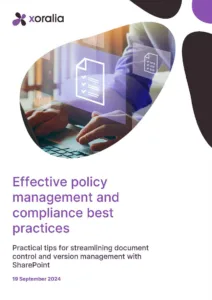Seven common mistakes made in policies and procedures management
- Hannah Barltrop

Policies and procedures management has never been the most glamorous business activity, but it has continued to prove to be one of the most useful – providing clarity for employees, reducing risks and underpinning efficiency. When employees can find all the policies and procedures they need, it helps them get things done quickly and successfully, and ensures they are following the right processes and making better decisions.
However, not every organisation carries out policies and procedures management as well as they could. Mistakes are common and when this happens it can lead to problems; employees cannot find the everyday policies they need and end up having to contact policy owners and wasting time. Even worse, employees may follow an out-of-date policy or simply ignore a policy that they cannot find, leading to potential risks.
In this article we’re going to explore seven of the most common mistakes made in policies and procedures management and how a solution like Xoralia can help avoid making them.
Not actively reviewing and updating policies
One of the main mistakes organisations make is not actively reviewing and updating their policies so they go out of date. This happens surprisingly often – a policy gets written with good intentions, usually to embed a change of rules or to clarify an area where there are particular risks. It might be then placed on the intranet as a useful reference resource. However, when the rules perhaps change – even if only slightly – the original policy never gets updated.
This has two impacts. Firstly, it means people simply don’t follow the right process. A new starter joins, downloads the policy, and will assume that it is up to date. Secondly, many employees realise a policy document is not up to date, so they simply ignore it. This also undermines confidence in whether other policies are up to date too. A central pillar of policy management has to involve actively reviewing and updating policies.
Not providing a central access point to browse and search for policies
Most organisations have policies, but they are not always easy to find. In fact, they tend to be distributed across multiple repositories. Some in a Microsoft Teams space. Some spread over SharePoint intranet departmental sites. Some within the HR platform. Some in the IT service platform such as Service Now. Perhaps others on the shared file drive. And some even only available by emailing the right person.
When policies are distributed like this they are very hard to find and access – and in practice people end up ignoring them, using out-of-date versions or relying on email to ask colleagues for policies, which is highly inefficient.
Many of these issues are solved by having a central access point for employees to browse and search for all the different policies they need. This might be available via the intranet or perhaps via a central SharePoint site. By providing one central access point for policies, it means employees can find what the right policy quickly. A core capability of most policy management software like Xoralia is establishing that centrally accessed policy library that employees trust and find useful.
Not applying version control
One of the biggest mistakes in managing policies is not properly applying strict version control to policies that are in circulation. When there are multiple versions of the same document floating around it gets very confusing. Employees don’t know which is the latest version and either end up using the wrong policy, or have to contact the policy owner to get sent a version that is up to date.
A variety of different approaches can support version control, including a document management solution like SharePoint or dedicated policy management software like Xoralia. Ensuring each version has an updated number, providing version information within the document itself and ensuring existing versions are replaced, also all help support version control.
Failing to communicate a policy change
Often when there is a policy change, its important that employees know about it, as it usually means it is a change of process or rules. But some organisations fail to communicate either that a policy has changed or what the change actually is. Employees who might actually be used to carrying out a process are very unlikely to refer to a policy to check if something has changed; this means that the policy change is effectively worthless as nobody is following it.
Some policy management solutions like Xoralia have features that mean employees to know that a policy ha both changed but also what the change is. These include personalized notifications alerting a user that a particular policy has changed as well as employee attestation processes to confirm that they have read the new policy. In Xoralia you can even ask specific questions so they can confirm they have understood and accept the particular change.
Not having clear ownership of policies
Effective policy management requires clarity over who is responsible for keeping each policy up to date. If you don’t have clear ownership of policies, then they simply won’t get updated. People may assume it is the responsibility of somebody else – and when a person leaves a company, then a policy may even get forgotten about.
Every policy needs to have a named individual associated with it who is the clear owner. While a policy might be the responsibility of a department or function, ownership should not be just at the team level. There needs to be an individual who is responsible for keeping a policy up to date and actively manages updates.
Making policies hard to understand and find
Policies are there to help employees follow particular processes, complete tasks more easily, reduce risks and make the right decisions. However, some policies are not always easy to follow or understand. This can be down to a variety of reasons:
- The title of a policy might be wrong or ambiguous so it makes it hard for employees to find
- A policy may be written more in “legalease” or use specialist language or terms that makes it harder to follow
- Some policies may be especially hard to follow for employees who are not native speakers of the language the policy is written in – and sometimes it may be necessary to perform a translation.
- Policies may be too long and the important detail that employees really need to access is hidden inside pages and pages
Although policy management software can’t write your policies for you, it can help you think about structuring them in ways that make it easier for employees to find what they need, so encourages elements such as clear titles, targeting policies to the right audience, and keeping policies shorter and manageable.
Mixing global and local policies up
In complex international organisations there will be global policies, but then also regional or local policies that apply specifically to a region or country. This is particularly the case elating to HR processes or where there are differences in using different systems and applications. In companies built up by acquisition, local processes and systems can endure for a long time.
Sometimes when policy management is not rigorously applied it can be difficult to ascertain when a policy is local, regional or global. Sometimes global policies are tweaked to be localised but then not properly renamed. Sometimes an intranet or Microsoft search can return ten versions of the same policy – some global and some local. This means it is very difficult for employees to find the right policy to follow – and it also means that they may question if they use a global policy, whether there is also a local policy they need to find.
When you have global and local policies living side by side, active policy management and the ability to target policies to different audiences based on their location becomes critical.
How policy management software like Xoralia helps
Many of the mistakes mentioned in this article are completely avoidable. Having a dedicated policy management solution like Xoralia can help by:
- Having a single policy library that is easily accessible via all staff through the intranet or within the Microsoft 365 digital workplace.
- Having search and intelligent views with custom filters to allow employees to find the policies they need and make it clear what is a global and a local policy.
- Having strict version control to avoid duplication of policies
- Delivering content lifecycle management features that will ensure polices are reviewed and updated, and that there is clear ownership for each policy.
- Ensuring that policies are now findable, visible, and trusted, encouraging policy owners to be more accountable and be more proactive in managing their policies and ensuring they are more readable and actionable.
- Using personalisation and targeting to ensure that people get a view of policies that have updated and which they must read, as well as access the right regional and local policies relevant to them.
- Including employee attestation and testing features so employees can confirm they have read an updated policy and also understood it, making it easier to communicate policy changes.
- And many more!
Need to better manage your policies? Arrange a demo!
When it comes to policy management, organisations can’t afford to make mistakes. If you’d like to see how a solution like Xoralia can help, then arrange a demo!
How policy management software can help
 We think the best place to store your policies is inside SharePoint. Most companies already have SharePoint as part of their Microsoft 365 subscription. Using SharePoint means you have full control of your policies, and many best practices can be achieved right out of the box. However, there are gaps and certain best practices are hard to achieve.
We think the best place to store your policies is inside SharePoint. Most companies already have SharePoint as part of their Microsoft 365 subscription. Using SharePoint means you have full control of your policies, and many best practices can be achieved right out of the box. However, there are gaps and certain best practices are hard to achieve.
To fill these gaps, and for best results we recommend using purpose-built policy management software for SharePoint and Microsoft 365.
We’ve developed a dedicated solution called Xoralia (pronounced Zor-ra-lee-a) that will ensure you have the best overall approach to policy management, supporting your users, policy owners and administrators.
We learned all about policy management from many years of building custom solutions for our clients on SharePoint. But we kept coming up against the same challenges, mostly caused by feature gaps in SharePoint. One day, a client asked us to build a policy management tool that filled these gaps. The trouble was, they didn’t have a lot of budget. But we had a good relationship with them and so we decided to collaborate on it provided we got to keep the code. Looking back, it was a pretty simple tool but over the years we have added more features and relaunched it. We’re now on version 3 and our original customer is still using it!
3 benefits you can expect from Xoralia
Make it easy to find policies
Centralised policy library with powerful search and filtering.
Reduce administrative burden
Automations and notifications so that all policy tasks are carried out on time
Demonstrate compliance and best practice
Sophisticated tracking and dashboards to drive and measure compliance.
And lots more!
What our clients say

AppSource review
A great time saver and tool for document management

Tim Galer
IT Coordinator
Hughes
Ideal partner for our regulated environment

Adam Lythgoe
IT Manager
LifeArc
How to get started with Xoralia
Step 1: request a demo
Fill out our form and we will be in touch to arrange a time. You can even book a time yourself.
Step 2: get a price proposal
If you think Xoralia is for you ask us for a quote. This will set out any options you may have.
Step 3: install and launch
We’ll install Xoralia in your environment (or you can do it yourself). We’ll provide training and support to get you up and running quickly.
Here's what you'll get
-
Central policy library
-
Search and filter tools
-
Mandatory read policies with attestations
-
Quizzes
-
Notifications and alerts
-
Employee dashboard
-
Line manager dashboard
-
Works on mobile, in Teams and SharePoint
-
New policy creation workflows
-
Policy update workflows
-
Review and approval gates
-
Policy version history
-
Compliance dashboard
-
Audit trail
-
Full reporting
And last but not least:
-
Professional implementation service and support
-
Evergreen software – frequent updates and improvements
-
Comes with our "it just works" support warranty – we’ll fix any bugs, often before you even notice
Ready to get started?
Connect with us to streamline your policy management and ensure effortless compliance.

AppSource review
Uniting excellence in integration and features for seamless policy management

Rian Stuart
IT Manager
TwinStream
